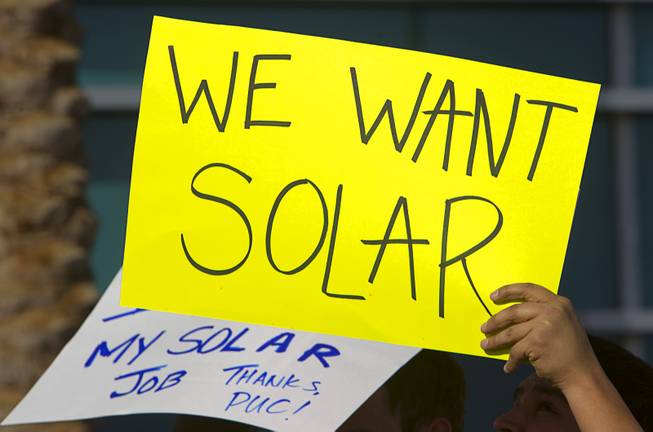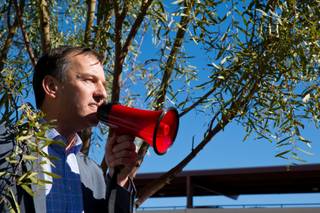
Solar supporters hold signs during a rally in front of Public Utilities Commission offices Wednesday, Jan 13, 2016.
Monday, March 28, 2016 | 2 a.m.
More Coverage
In December, the Public Utilities Commission of Nevada approved a price hike for most solar customers, tripling a fixed charge and slashing the value of credits solar customers can earn for sending excess electricity to the grid as part of a program known as net metering.
As a result, national rooftop solar companies SolarCity and Sunrun pulled sales and installation teams from the state, resulting in hundreds of layoffs. Customers were caught in the middle, left wondering whether converting to solar was worthwhile.
Here, we answer consumers’ questions.
From a financial standpoint, does it makes sense to install a solar system?
Most experts say no. But a number of local companies still offer installations.
Why are installation firms still operating in the valley?
Despite a sharp drop in sales, the companies still have customers. Some of the customers are willing to go solar to reduce their carbon footprint, regardless of cost. A small few believe they still will be able to break even on their investment or gain from it. A number hope that breakthroughs in energy storage technology or a change in regulation will result in their investments being profitable in the long run.
How much does an average rooftop solar array cost?
Depending on size and output, typically between $15,000 and $30,000, but sometimes more. Customers who buy panels outright can be eligible for a federal incentive that provides a 30 percent tax credit on the panel price.
Are there other options to pay for solar?
Yes. Several companies, like SolarCity and Sunrun, offer 20-year leasing options. The company covers the upfront cost of the panels and charges a fee per kilowatt hour that’s lower than utility electricity. It’s hard to put an average price on the bill because it can vary widely depending on configuration and consumption. Customers who want to buy solar systems also can seek financing from a bank.
How much does the average homeowner save on his or her electric bill?
Under previous net metering rules, homeowners were expected to save 10 to 20 percent on their NV Energy bill. However, some solar customers have reported seeing their bill as low as $5 during some months.
Why is there such a dramatic decrease when switching to solar?
Because when solar users generate some of their own electricity, they buy less electricity from NV Energy, which lowers their utility bills. Also, under prior net-metering rules, NV Energy paid customers about 11 cents per kilowatt hour for energy they returned to the grid. The more electricity a solar customer sold, the lower his or her bill.
If I can decrease my monthly bill to a few bucks, what’s the catch?
Most solar customers who decide to install rooftop systems choose to lease the equipment. That means they have to pay a second monthly bill to SolarCity, Sunrun or a similar firm. Customers rely on the savings in their utility bills to offset their payments to the solar company. If utility bills increase, those savings could disappear.
Will customers still see savings under the new rate structure?
Solar advocates say no, but it depends on each customer’s circumstances. That said, the rules recently changed in favor of NV Energy, and regulations are expected to become even less favorable to solar consumers over the next 12 years. While customers will continue to save money by buying less energy, the savings are unlikely to be large enough to offset bills for leasing the equipment. Solar advocates, including the Alliance of Solar Choice, argue that the ruling eliminated the savings entirely.
Why?
The PUC ruling increased customers’ bills. For one, it tripled a fixed charge that solar customers pay. It also lowered the amount NV Energy pays customers for excess energy, from about 11 cents per kilowatt hour to about 2 cents per kilowatt hour. The changes are expected to be phased in through 2028.
If I have a solar lease now or I decide to get one, will that make it more difficult for me to sell my home?
It could. Solar leases are tied to the property where equipment is installed, so a buyer would assume the contract. But utility rates are variable. Solar could become attractive again if the price of, say, natural gas increases, which could drive up utility rates.
Is the PUC ruling set in stone?
There are several efforts underway to undo the decision. The Alliance for Solar Choice is appealing the ruling in court. Another alliance of solar advocates is pushing to add a measure to the November ballot that effectively would undo the commission’s decision.
What about Tesla batteries? Could I use those to store energy?
Many industry observers see batteries as a way to circumvent the new rules. Tesla batteries theoretically could store excess electricity to be released at night, allowing the sun to power a home 24/7. At the least, the batteries could allow customers to rely on solar panels for longer periods rather than sell excess energy to NV Energy for lower prices. And the batteries could provide backup power during blackouts. At least one other battery company has partnered with several local solar installers, who already are promoting battery installations. There is a catch, however: The batteries can be expensive, potentially costing thousands of dollars.


Join the Discussion:
Check this out for a full explanation of our conversion to the LiveFyre commenting system and instructions on how to sign up for an account.
Full comments policy